In The Outer Worlds, the best weapon is being able to lie about everything
In our hands-on time with Obsidian's upcoming RPG, we discovered that honesty isn't the best policy.
A lot of games have extra-difficult ways to play: you can finish Deus Ex without killing anyone, sneak through Dishonored without ever once being detected, and play Thief with absolutely zero combat. Earlier this month Phil and I each played about 90 minutes of The Outer Worlds, Obsidian Entertainment's upcoming first-person RPG, and I can already predict the toughest way to complete it:
By making it through the entire game without ever telling a lie.
It's gotta be nearly impossible because in just this short session alone I lied constantly. I lied to a drug dealer who hired me to track down his missing stashes, telling him I couldn't find them so I could keep the drugs for myself. Phil lied to a weeping mom about the fate of her missing son and claimed to be a professional athlete so he could investigate a gambler's murder. I lied to an animal rescue worker, a corporate security guard, and a shop vendor so I could get my hands on an item I wanted. I even disguised myself as an employee of a factory so I could murder the owner, and when the disguise failed I lied my way out of trouble. Twice.
There are just so many opportunities to lie, and there's so much to be gained from dishonesty. Plus, being a huge liar is just fun. A squeaky clean, completely honest playthrough of The Outer Worlds—that's going to be the true nightmare mode.
Character study
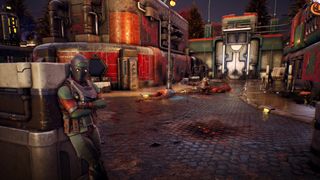
Of course, the quality of a lie needs to be matched by the quality of the people you're lying to, and thankfully the small slice of The Outer Worlds I experienced was full of enjoyable and eccentric characters. The NPCs I spoke to were well-written and voiced, and I spent a good deal of my playtime just standing perfectly still, listening to everything they had to say and wishing I made more time to talk (and lie) to everyone else.
In the town of Fallbrook on the planet Monarch, I took a job from Nelson Mayson, a drug distributor with a bowler hat, a curled mustache, and a charming lack of subtlety. "Might I interest you in a surefire scheme?" he asked. "Wink, wink." Yes, he actually said "wink" instead of just winking.
His scheme was hiring me to find his drug shipment—he'd been using alien critters called sprats to move his product, and unsurprisingly the little buggers had all disappeared. I recovered the drugs, first from some sprat corpses, and then from digging through piles of sprat poop. Both times I reported back to Mayson that I hadn't found a thing. He was upset, naturally, but I walked away with a pocketful of drugs I assume can be put to some use.
PC Gamer Newsletter
Sign up to get the best content of the week, and great gaming deals, as picked by the editors.
I also chatted with a young and polite insurance agent who explained to me, at great length, the various insurance options available on Monarch, including a policy to protect the expressive eyebrows of character actors and "corporate executives with menacing stares." They cover dismemberment (the policy is half-off, ha ha) and disastrous marriages and salesmen who lie about the shoddy products they sell.
One of the only thing they don't cover is "dullness of mind," which, when pressed, she admits is another way of saying "stupidity."
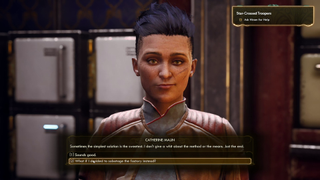
Even the conversations that didn't result in new missions always provided amusement or a bit of interesting information.
I also met Catherine Malin, the enjoyably gruff proprietor of Malin's House of Hospitality. She's apparently a bit of a crime boss in Fallbrook, and our conversation quickly turned to the owner of a factory she wanted to claim for herself. When I said it sounded like the job would involve murder and mayhem, she replied: "Stars! I hope so!" Another character not burdened with subtlety.
There were lesser characters, too, who still proved enjoyable in small doses, like a robotic sentry who caught me sneaking around the factory. I disabled the bot by feeding him a paradox: "This statement is false." There were intimidating yet easily bamboozled corporate sentinels, a snooty fellow not named just Chet but "The Chet," and a nerdy animal rescue worker who called me a "domicile-intruder" when I walked into his house.
Nearly everywhere I turned in Fallbrook, there was someone to talk to or listen to, and even the conversations that didn't result in new missions always provided amusement or a bit of interesting information that helped fill in a picture of the off-kilter world I was lying my way through.
Call to arms
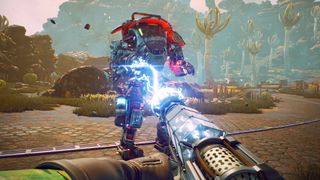
To fill the gap between conversations, I did plenty of shooting in The Outer Worlds, too. Monarch has roads that seem mostly safe apart from the occasional band of marauders and their vicious pets, but wander off the beaten path and things very quickly get much more dangerous. I decided to tackle the personal quest of one of the two companions following me, a woman named Nyoka, which involved finding the grave of a former friend located in the swampy region outside Fallbrook.
I was playing a character who was level 11, armed with an assault rifle with a modded 'Exact-O-Sight' scope for sniper shots, a pistol, a sword that did toxic damage, and a heavy machine gun. I'd later replace my sword with a Tossball Blocker—Tossball being a sci-fi sport in The Outer Worlds, and the blocker being the implement you use to play it, sort of like a tennis racket only with a crackling energy field instead of strings. (I don't yet know the rules of Tossball, but the scoop is very handy for beating alien lizards to death, so I'm sure hoping I'll get to see a Tossball match played at some point.)
I'm happy the dialogue has so many appealing options because if there's a part of The Outer Worlds I'm skeptical of, it's definitely the combat. Most of the enemies I faced—typically medium and large sized dinosaur-types—don't seem especially dynamic or interesting to fight. They roar, they lumber after you, they spit goo or fire, and the big ones take a ton of damage before they drop.
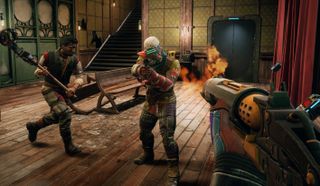
There's a stiffness to the gunplay that harkens back to Fallout 3, more RPG than shooter. The animations are nicely done but the heavy machine gun barely has any recoil, which makes it feel tame even as it chews through rampaging aliens. The melee feels weightless—slicing or bludgeoning a foe should make an impact but it just feels like swinging through air, even when you connect. The combat isn't terrible by any stretch—it just felt insubstantial, and even in the short play session I got a bit tired of mowing down the same pack of angry dinos again and again. The full game will need far more interesting weapons and enemy types to keep combat engaging.
I do appreciate the power to slow down time in short bursts, which helps with landing headshots on strafing marauders or with pinpointing Mantipillars, the one enemy I did enjoy fighting. They're large caterpillar-types who spit plasma, then quickly curl up in a ball and roll away, then pop back up for more spitting. Companions can be put to good use—tap a hotkey to unleash their special attacks which do big bursts of damage, and give you a quick break from the combat as you watch their attack animations play.
Role call
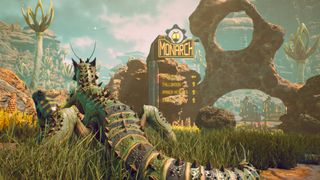
I could unlock a skill for Nyoka called Bonus Support Lie, which would increase my own lying skill when she was with me.
As for the outer worlds themselves, we only got to see Monarch, and between Phil and I we only visited two main towns and some of the surrounding areas—the map and signposts point to several others. While The Outer Worlds isn't a completely open world experience, even the small areas we got to travel through still felt pretty big, and with all the NPCs hanging around and not enough time to meet them all, there was a lot that got left undone.
And I know I've been hyping all the lying we did, but there are other skill-based conversational options—persuasion, charm, and intimidation—that I put to use to open up new avenues and possibilities in the chats I had. And even without skill checks, most conversations give you a choice of attitudes from a polite do-gooder to, you know, kind of a dick.
Unfortunately, I didn't get a chance to explore the character-building aspects of The Outer Worlds: the character I was given was already built. But I did see that your companions have perks, and some of their skills can buff your own—I was very happy to see I could unlock a skill for Nyoka called Bonus Support Lie, which would increase my own lying skill when she was with me. That's definitely a first pick for me.
See? More lies. I'm telling you, an honest playthrough of The Outer Worlds is going to be a near-impossibility.

Chris started playing PC games in the 1980s, started writing about them in the early 2000s, and (finally) started getting paid to write about them in the late 2000s. Following a few years as a regular freelancer, PC Gamer hired him in 2014, probably so he'd stop emailing them asking for more work. Chris has a love-hate relationship with survival games and an unhealthy fascination with the inner lives of NPCs. He's also a fan of offbeat simulation games, mods, and ignoring storylines in RPGs so he can make up his own.
Most Popular



